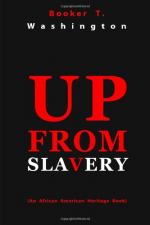
|
| Name: _________________________ | Period: ___________________ |
This test consists of 15 multiple choice questions and 5 short answer questions.
Multiple Choice Questions
1. Booker remarks that too many people use the Christmas season as:
(a) An excuse to ignore work and drink excessively.
(b) A time to complain to relatives and employers.
(c) A holiday for bribing teachers with gifts.
(d) A time to overindulge in rich foods.
2. When Booker travels by train and two women recognize him, they insist that he join them for dinner. Why does this worry him?
(a) He does not want his girlfriend to become jealous.
(b) He does not recognize them and wonders what they want.
(c) He expects to be confronted because he is a black man dining in the white section.
(d) He does not want their husbands to become jealous.
3. In the chapter "Raising Money," what is the outcome of the meeting Booker has with a man he had been told might be interested in donating to his school?
(a) The man donates a large sum.
(b) The man does not make a donation.
(c) The man explains he is no longer wealthy.
(d) The man cuts the meeting short and asks Booker to leave.
4. Booker points out that those who can't offer his Tuskegee school monetary donations instead offer:
(a) Home-cooked meals.
(b) Advice.
(c) Their time.
(d) Family heirlooms.
5. With a working kiln, Booker and his students make bricks for their school and for what other purpose?
(a) For a community center.
(b) To build a homeless shelter.
(c) For a hurricane shelter.
(d) To sell to the community.
6. "Porter Hall" at Tuskegee Institute is named after whom?
(a) A.H. Porter, who donated a large sum.
(b) The mayor of Tuskegee at the time the school opened.
(c) Jonathan Porter, Booker's childhood friend.
(d) The state governor at the time the school was established.
7. In his chapter on public speaking, the author expresses that before a speech, he:
(a) Practices in front of the mirror.
(b) Never ceases to be nervous.
(c) Takes a warm bath to relax.
(d) Typically rewrites his entire speech.
8. Why does Booker say it was worth the effort to travel two thousand miles to give a five-minute speech?
(a) He does not mind spreading the word about his school.
(b) He enjoyed meeting the President.
(c) He reaches influential people, and more speaking engagements result.
(d) The women's group makes a generous donation to his school.
9. In "Raising Money," after his meeting with a man whom he expected would donate to his school, how does Booker feel?
(a) As though he wasted his time.
(b) Angry but not defeated.
(c) Very grateful.
(d) Elated.
10. Booker states that efforts to foster community support for his Tuskegee school are:
(a) Tiresome.
(b) Taking up too much of his time.
(c) Successful.
(d) Met with resistance.
11. Washington travels two thousand miles to give a five-minute speech to whom?
(a) The President of the U.S.
(b) A women's group.
(c) A group of influential people.
(d) A retired general.
12. After dining with two women in a train's dining section, Booker goes to the smoking car where he expects:
(a) To catch up on reading.
(b) To be asked to leave.
(c) To be berated by the men.
(d) To meet up with a friend.
13. When asking for funds for his school from the wealthy, Booker notes that it's best to:
(a) Try to make the donors feel guilty.
(b) Present facts about the school and not appear to beg.
(c) Compliment the donors profusely.
(d) Speak loudly and quickly to generate excitement.
14. When Booker goes to the smoking car of a train after dining with two women, what happens?
(a) Everyone greets him and talks to him about his work.
(b) Everyone in the smoking car walks out.
(c) He is asked to leave.
(d) He is greeted politely and left alone.
15. Does General Armstrong teach at Tuskegee?
(a) Yes, part-time.
(b) Yes, full-time.
(c) No, but he heads a building project.
(d) No, he's at Hampton.
Short Answer Questions
1. Regarding the people that Booker approaches to support Tuskegee Institute, he notes that:
2. What does Booker feel should determine the right to vote?
3. Worrying over his students, Booker often loses:
4. What do Booker and his students discover when they first try to make bricks?
5. Because he's disappointed by how the people of Tuskegee regard Christmas, what does Booker introduce at his school?
|
This section contains 741 words (approx. 3 pages at 300 words per page) |

|




